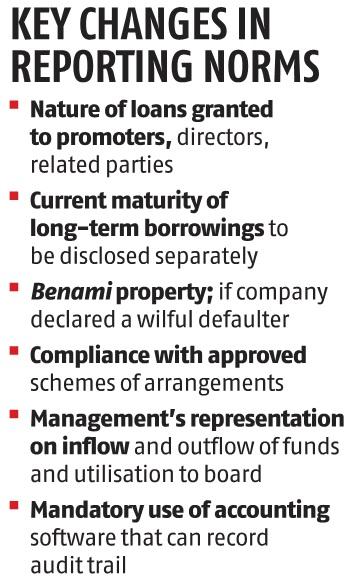The Ministry of Corporate Affairs (MCA) has made amendments to rules in the Companies Act, mandating firms to disclose their investments in cryptocurrencies, spend on corporate social responsibility (CSR), and benami property transactions, among others, in their financial statements from the next financial year.
Companies will also have to disclose their relationship with struck-off firms and the details of title deeds of immovable property not held in the name of the company.
Nischal S Arora, partner at Nangia Anderson, said companies would have to disclose cryptocurrencies in which they had traded; profit and losses in such trades; and deposits or advances taken from other persons in these currencies. “While the government is already working on a Bill on cryptocurrencies, the rules on disclosures have made it clear that the government wants to gather data on digital currencies,” he said.
A few other amendments focused on broadening the scope of audit reporting. Now, management representations on advances, loans, and investments, etc, will have to be reported. One of these changes requires companies to use those accounting software for maintaining its books that allow it to record the audit trail of every transaction.

Companies will also have to disclose insolvency and bankruptcy matters and information relating to the valuation of the company's assets in the board's report. The new rules come into effect from April 1, 2021.
“The new set of rules introduced by the MCA will require the management and auditors to play a greater role as far as the flow of information and representations is concerned,” said Manendra Singh, associate partner at Economic Laws Practice, Mumbai.
Companies will also have to disclose the expenditure on CSR activities of the previous years as well, including reasons for any shortfall. Till now, CSR spend has been part of the directors' report, but now companies will have to disclose it in their financial statements.
In that sense, there is some mismatch between the penal provisions for CSR — introduced from January this year — and the reporting of such spend, Arora said.

Kapil Rana, founder and chairman of HostBooks, said the amendments required companies to ensure that the board report contained the application or any proceeding pending under the Insolvency and Bankruptcy Code (IBC) during a year, along with their status at the end of the financial year.
The report should also contain the details of the difference between the amount of valuation of related assets done at the time of one-time settlement and the valuation done while taking a loan from the banks or financial institutions, along with the reason thereof, he said.
From next year, the audit report will have to disclose the information cited above if those were not revealed in notes to accounts. Also, it has to be disclosed whether dividend declared or paid was in compliance with Section 123 of the Companies Act. The section mandates companies to declare dividend only out of profit or money given by the governments in lieu of guarantees given by them.
Prateek Agarwal, partner at Nangia and Co, said some of these requirements had significant implications for smaller businesses in case the existing accounting software did not support them. “We expect that the Institute of Chartered Accountants of India (ICAI) will soon issue detailed guidance on these to consider the same in the audit reports,” he said.
On the new requirement of software, Singh said this might prove to be a challenge for companies that didn't use software with such compliant features.
Rana said companies were also mandated to create the edit log of each change made in account books with the proper dates.






